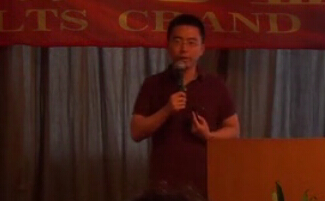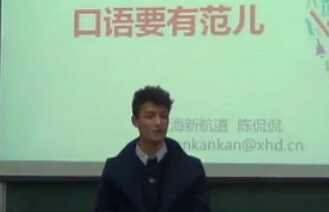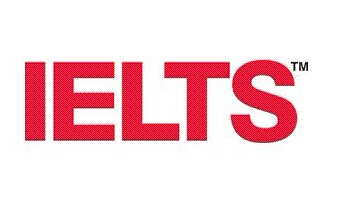雅思阅读真题之Global warming
2013-08-01 11:37 供稿单位: 新航道
出国英语考试有哪些 雅思6.5是什么水平 雅思阅读评分标准 托福阅读评分标准 雅思和托福的区别
Global warming
You should spend about 20 minutes on Questions 1-13 which are based on Reading Passage 1 below.
Questions 1-5 Reading Passage 1 has six paragraphs A-F .
Choose the most suitable headings for paragraphs B-F from the list of headings below.
Write the appropriate numbers i-viii in boxes 1 - 5 on your answer sheet.
List of Headings
i The plaintiffs?viewpoints on regulating emission
ii Federal government being taken to court
iii Possible impact of the case on other lawsuits
iv Regulating air pollution by twelve States
v Stance of the Bush administration
vi Viewpoints of Bill Clinton on regulation
vii The call for emission caps and reduction
viii Uncertainty in ruling by the Supreme Court
Example Answer
Paragraph A ii
1. Paragraph B _____
2. Paragraph C _____
3. Paragraph D_____
4. Paragraph E _____
5. Paragraph F _____
Green states take the federal government to court
Nov 30th 2006
From The Economist print edition
A WHEN the subject is global warming,the villain is usually America . Although it produces a quarter of the greenhouse gases that are heating up the planet,it refuses to regulate them. When other countries agreed on an international treaty to do so——he Kyoto protocol——America failed to ratify it. But not all American officialdom is happy with the federal government's stance. In fact,12 states disagree so fiercely that they are suing to force it to curb emissions of carbon dioxide,the most common greenhouse gas. The Supreme Court heard argument in the case on November 29th. The outcome will not be known for months,but the political wind seems to be shifting in favour of firmer action to counter climate change.
B The Clean Air Act charges the Environmental Protection Agency (EPA) with regulating air pollution from vehicles. But the EPA argues that Congress did not intend to include CO2 under that heading,and that to do so would extend the EPA's authority to an unreasonable extent. Furthermore,it contends that regulating emissions would not do good unless all or most other countries did the same. That is in keeping with the policies of President George Bush,who opposes mandatory curbs on emissions and believes that any international accord on global warming should apply to all countries——unlike the Kyoto protocol,which exempts poor ones,including big polluters such as China and India . Ten states,among them gas-guzzling Texas and car-making Michigan,also back the EPA.
C The plaintiffs comprise 12 states,three cities,various NGOs,and American Samoa,a Pacific territory in danger of vanishing beneath the rising ocean. They are supported by a further six states,two power companies,a ski resort,and assorted clergymen,Indian tribes and agitated grandees such as Madeleine Albright,a former secretary of state. They point out that under the administration of Bill Clinton,the EPA decided that it did have the authority to regulate CO2. The act,they note,says the EPA should regulate any air pollutant that "may reasonably be interpreted to endanger public health or welfare". It goes on to define public welfare to include "effects on soils,water,crops,vegetation,manmade materials,animals,wildlife,weather,visibility,and climate".
D The Supreme Court may give a mixed ruling,decreeing that carbon dioxide is indeed a pollutant,but one the EPA is free to ignore or regulate as it pleases. Or it might dismiss the complaint on the grounds that the plaintiffs did not have the right to lodge it in the first place. In theory,they must prove that the EPA's foot-dragging has caused them some specific harm that regulation might remedy——a tall order in a field as fraught with uncertainty as climatology. Even if the court found in the plaintiffs' favour,rapid change is unlikely. By the time the EPA had implemented such a ruling,Congress would probably have superseded it with a new law.
E That is the point,environmental groups say. They want Congress to pass a law tackling global warming,and hope that a favourable court ruling will jolly the politicians along. Moreover,the case has a bearing on several other bitterly-contested lawsuits. Carmakers,for example,are trying to get the courts to strike down a Californian state law based on certain provisions of the Clean Air Act that require them to reduce their vehicles' CO2 emissions. If the Supreme Court decides that the act does not apply to CO2,then the Californian law would also be in jeopardy. That,in turn, would scupper the decision of ten other states to adopt the same standard.
F However the Supreme Court rules,many state governments are determined to tackle climate change. California is in the vanguard. Its legislature has passed a law that will cap and then reduce industrial emissions of greenhouse gases. Seven eastern states have formed the Regional Greenhouse Gas Initiative,which will treat emissions from power plants the same way. Almost 400 mayors have signed an agreement to cut their cities' emissions in line with Kyoto . Many businesses,even some power companies,would rather see regulation now than prolonged uncertainty. And several of the leading contenders for 2008's presidential election are much keener on emissions caps than Mr Bush. Change is in the air.
副标题#e#
Questions 6-9 Do the following statements reflect the views of the writer in the reading passage?
In boxes 6 - 9 on your answer sheet write
YES if the statement reflects the views of the writer
NO if the statement contradicts the views of the writer
NOT GIVEN if there is no information about this in the passage
6. Texas and Michigan are among the 12 states which call for regulating air pollution.
7. An American island is in danger of disappearing beneath the rising ocean.
8. The plaintiffs can prove that the EPA抯 foot-dragging has caused them harm that the regulation might remedy.
9. The Supreme Court's ruling may influence the results of other lawsuits.
Questions 10-13 Answer the following questions with NO MORE THAN THREE WORDS each in boxes 10 - 13.
10. What country produces 25% of the world's greenhouse gases?
11. Which president opposes mandatory curbs on emission, George Bush or Bill Clinton?
12. Who are trying to get the courts to strike down a Californian state law that require them to reduce their vehicles' CO2 emissions?
13. What would some power companies rather see than prolonged uncertainty at present?
副标题#e#
Key and Explanations:
1. v ( See para.B: Furthermore, it(EPA) contends that regulating emissions would not do good unless all or most other countries did the same. That is in keeping with the policies of President George Bush. )
2. i (See para.C: They point out that……he EPA decided that it did have the authority to regulate CO2. The act?says the EPA should regulate any air pollutant that 搈ay reasonably be interpreted to endanger public health or welfare? )
3. viii (See para.D: The Supreme Court may give a mixed ruling, decreeing that carbon dioxide is indeed a pollutant, but one the EPA is free to ignore or regulate as it pleases. Or it might dismiss the complaint on the grounds that the plaintiffs did not have the right to lodge it in the first place. )
4. iii (See para.E: Moreover, the case has a bearing on several other bitterly-contested lawsuits. )
5. vii 牋 (See para.F:…… many state governments are determined to tackle climate change. And several of the leading contenders for 2008's presidential election are much keener on emissions caps than Mr Bush. )
6. No. ? (See para.B, lines 11-12: Ten states, among them gas-guzzling Texas and car-making Michigan, also back 支持 the EPA. )
7. Yes. ? (See para.C, lines 2-3: American Samoa , a Pacific territory in danger of vanishing beneath the rising ocean )
8. Not Given. ? (See para.D, Lines 5-6: In theory, they must prove that the EPA's foot-dragging has caused them some specific harm that regulation might remedy——a tall order in a field as fraught with uncertainty as climatology )
9. Yes. ? (See para.E, lines 3-4: 楼主
9. Yes. (See para.E, lines 3-4: the case has a bearing意义 on several other bitterly-contested lawsuits.)
10. America / The U.S. (See para.A, lines 1-3: When the subject is global warming, the villain is usually America. Although it produces a quarter of the greenhouse gases that are heating up the planet, it refuses to regulate them.)
11. George Bush (See para.B, line 7: That is in keeping with the policies of President George Bush, who opposes mandatory curbs on emissions)
12. Carmakers (See para.E , lines 4-7: Carmakers, for example, are trying to get the courts to strike down a Californian state law based on certain provisions of the Clean Air Act that require them to reduce their vehicles' CO2 emissions.)
13. Regulation (See para.F, lines 8-7: Many businesses, even some power companies, would rather see regulation now than prolonged uncertainty.)
Notes:
1. Kyoto Protocol: 京都议定书
2. That is in keeping with the policies of President George Bush,who opposes mandatory curbs on emissions and believes that any international accord on global warming should apply to all countries—unlike the Kyoto protocol,which exempts poor ones,including big polluters such as China and India. 那与布什总统的政策保持一致。布什反对对排放采取强制手段,认为任何有关全球变暖的国际条约都应适用于所有的国家而不是像京都议定书那样免除包括中国和印度这样的大的污染制造者在内的贫穷国家的义务。
以上就是新航道雅思频道为大家整理的雅思阅读真题之Rogue theory of smell gets a boost,希望对大家有帮助,更多资讯、资料请访问新航雅思真题频道 https://www.xhd.cn/ielts/yucezhenti/

- 新航道,英语成功之道。时间获取新航道英语学习资料和新鲜资讯,请在微信公众账号中搜索「新航道英语」或者「xhdenglish」,或用手机扫描左方二维码,即可获得新航道每日精华内容推送和英语学习经验分享,并参与新航道举办的各项活动。
精彩专题
更多视频荟萃
更多
-
新航道姚骏鹏-雅思阅读高分攻略
时长:03-06

-
新航道陈侃侃-雅思口语要有范儿
时长:03-06

-
【3分钟学雅思】王大锤告诉你为啥药不能停
时长:01-12

-
【3分钟学雅思】全世界个感官餐厅
时长:01-12
热门文章
更多
-
8月31日雅思广州考机考初体验
选择机考模式的考生将通过机考模式参加听...








